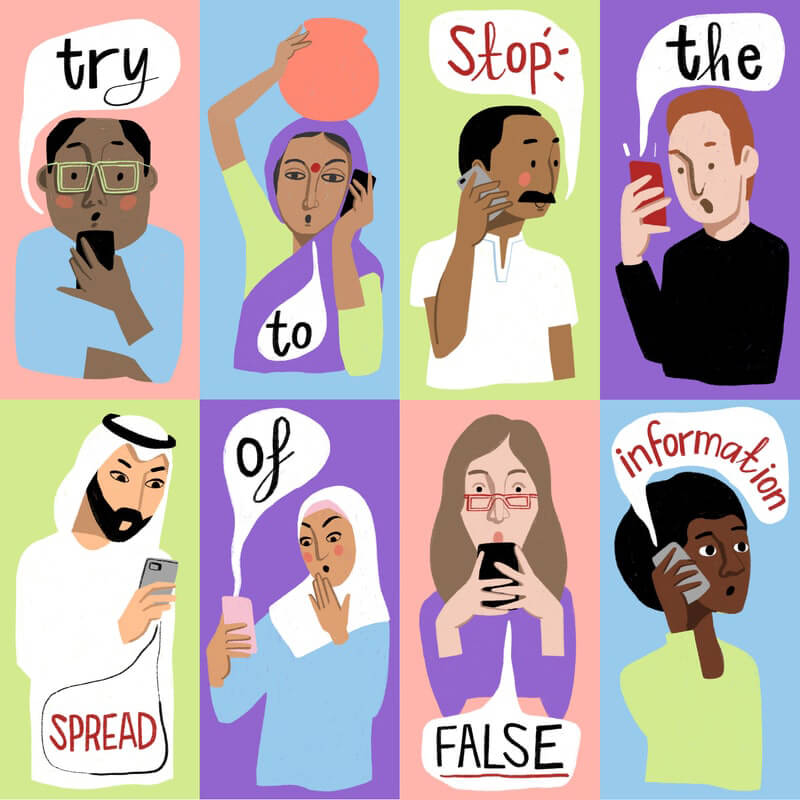Registered with the Registrar of Newspapers for India under R.N.I 53640/91
Vol. XXX No. 6, July 1-15, 2020
Fighting the Misinformation Epidemic
by Varsha Venugopal
 Image created by Ruth Burrows, submitted for United Nations Global Call Out to Creatives – help stop the spread of Covid-19.
Image created by Ruth Burrows, submitted for United Nations Global Call Out to Creatives – help stop the spread of Covid-19.In one of the many video clips available of him online, a pleasant-faced, smiling gentleman addresses the camera with a quiet confidence. In Tamil, he breaks the extraordinary news that he has the cure for the novel coronavirus. “Infect me with the virus, I don’t mind. I have been treating my patients without wearing a mask or protective gloves… I don’t even use a hand sanitizer. After living in terror for the past four months, some people are now walking the streets without any worry, thanks to the confidence that I have given them,” he says. In other videos subsequently seized by the police, he dismisses the preventive measures recommended by experts and calls for people to question the authorities. By the time the police apprehended him as a quack last month in Chennai, the gentleman had already received widespread attention, courtesy social media and even some coverage in a few mainstream news outlets. It is troubling to think of the number of people who may have been led astray by him.
Unfortunately, this gentleman isn’t an outlier. In fact, it was just last week that the Ayush Ministry had to restrain a giant national brand from advertising it’s new product as a drug that ‘cures’ the novel coronavirus as this claim was not verified or proven. Chennai itself has had its fair share of panic-inducing fake news, from audio clips claiming that the virus is an Illuminati conspiracy to control the population, to false alarms that the State is falling short of medical facilities to treat patients. Even the most ludicrous claims lose their potential for comedy when one thinks of the consequences. At a time when every member of society must act in a coordinated fashion to prevent the spread of disease, misinformation acts as a serious disruptor that endangers progress and even, in some cases, fans the flames of social conflict. It really is no laughing matter.
According to an analysis by BOOM, an Indian fact-checking website, misinformation around the coronavirus evolved as the crisis unfolded. Unverifiable conspiracy theories about China and false theories around treatments and preventive measures for the virus trended in January and February; March drummed up panic about the lockdowns and spread claims that the virus was a bioweapon; Communally-charged disinformation targeting Muslims surfaced in April. The fake news was disseminated largely through digital platforms like Facebook, What’s App and Twitter.
Spreading rumours and intentionally spreading fake news are, of course, illegal activities. Further, the Epidemic Diseases Act, 1987 and the Tamil Nadu Public Health Act, 1939, also carry provisions against misinformation that endangers citizen health. To aid law enforcement, the Bureau of Police Research and Development (BPRD) published, last month, a manual to help law enforcement agencies identify fake news that is clearly intended to spread panic, hatred and communal violence. The government has also tasked social media platforms with the responsibility to identify and address misinformation around the Covid-19 pandemic on their own sites. Consequently, Facebook has banned ads that promise a cure or guarantee protection from the disease; it also actively fact-checks member posts for misleading content. In collaboration with the government, What’sApp has launched the multilingual MyGov Corona Helpdesk, a chatbot that provides authentic information about the coronavirus. Even the popular video app TikTok works closely with the government to identify and remove false content.
However, it takes two to tango. Experts say that to curb the spread of misinformation in an effective manner, it is important for the public to participate in the effort as well. Developing a healthy scepticism towards information that come from unusual sources is key. Experts also suggest that users who consume digital and social media content must actively diversify the sources of information that they follow, in order to develop a comprehensive, unbiased understanding about a topic. Further, while it may not be feasible to personally fact-check every piece of news that comes one’s way, it is important to resist the urge to share sensational news published by a source that is not trusted or verifiable.
Fake news isn’t a new phenomenon; it has always been around. But it is more virulent today, thanks to digital platforms that make large-scale dissemination easy, cheap and quick. We can tackle it together, if we take a united stance. In fact, we must. We would do well to remember that unity and coordination are perhaps our brightest hopes during these troubling times.

